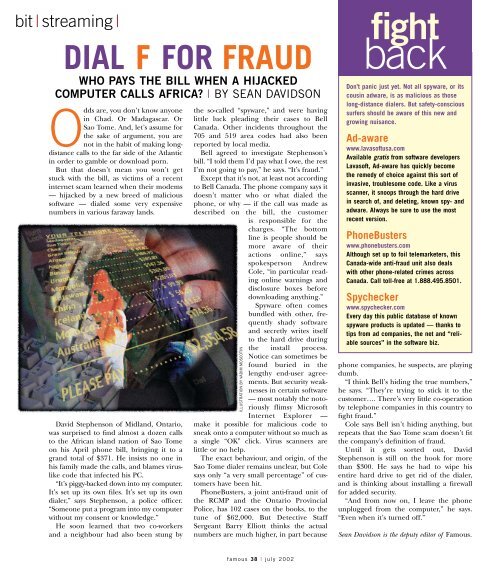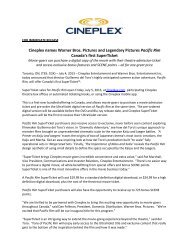MR. NICE GUY
MR. NICE GUY
MR. NICE GUY
Create successful ePaper yourself
Turn your PDF publications into a flip-book with our unique Google optimized e-Paper software.
it | streaming |<br />
DIAL F FOR FRAUD<br />
WHO PAYS THE BILL WHEN A HIJACKED<br />
COMPUTER CALLS AFRICA? | BY SEAN DAVIDSON<br />
Odds are, you don’t know anyone<br />
in Chad. Or Madagascar. Or<br />
Sao Tome. And, let’s assume for<br />
the sake of argument, you are<br />
not in the habit of making longdistance<br />
calls to the far side of the Atlantic<br />
in order to gamble or download porn.<br />
But that doesn’t mean you won’t get<br />
stuck with the bill, as victims of a recent<br />
internet scam learned when their modems<br />
— hijacked by a new breed of malicious<br />
software — dialed some very expensive<br />
numbers in various faraway lands.<br />
David Stephenson of Midland, Ontario,<br />
was surprised to find almost a dozen calls<br />
to the African island nation of Sao Tome<br />
on his April phone bill, bringing it to a<br />
grand total of $371. He insists no one in<br />
his family made the calls, and blames viruslike<br />
code that infected his PC.<br />
“It’s piggy-backed down into my computer.<br />
It’s set up its own files. It’s set up its own<br />
dialer,” says Stephenson, a police officer.<br />
“Someone put a program into my computer<br />
without my consent or knowledge.”<br />
He soon learned that two co-workers<br />
and a neighbour had also been stung by<br />
the so-called “spyware,” and were having<br />
little luck pleading their cases to Bell<br />
Canada. Other incidents throughout the<br />
705 and 519 area codes had also been<br />
reported by local media.<br />
Bell agreed to investigate Stephenson’s<br />
bill. “I told them I’d pay what I owe, the rest<br />
I’m not going to pay,” he says. “It’s fraud.”<br />
Except that it’s not, at least not according<br />
to Bell Canada. The phone company says it<br />
doesn’t matter who or what dialed the<br />
phone, or why — if the call was made as<br />
described on the bill, the customer<br />
is responsible for the<br />
charges. “The bottom<br />
line is people should be<br />
more aware of their<br />
actions online,” says<br />
spokesperson Andrew<br />
Cole, “in particular reading<br />
online warnings and<br />
disclosure boxes before<br />
downloading anything.”<br />
Spyware often comes<br />
bundled with other, frequently<br />
shady software<br />
and secretly writes itself<br />
to the hard drive during<br />
the install process.<br />
Notice can sometimes be<br />
found buried in the<br />
lengthy end-user agreements.<br />
But security weaknesses<br />
in certain software<br />
— most notably the notoriously<br />
flimsy Microsoft<br />
Internet Explorer —<br />
make it possible for malicious code to<br />
sneak onto a computer without so much as<br />
a single “OK” click. Virus scanners are<br />
little or no help.<br />
The exact behaviour, and origin, of the<br />
Sao Tome dialer remains unclear, but Cole<br />
says only “a very small percentage” of customers<br />
have been hit.<br />
PhoneBusters, a joint anti-fraud unit of<br />
the RCMP and the Ontario Provincial<br />
Police, has 102 cases on the books, to the<br />
tune of $62,000. But Detective Staff<br />
Sergeant Barry Elliott thinks the actual<br />
numbers are much higher, in part because<br />
ILLUSTRATION BY VADIM MOSCOTIN<br />
famous 38 | july 2002<br />
fight<br />
back<br />
Don’t panic just yet. Not all spyware, or its<br />
cousin adware, is as malicious as those<br />
long-distance dialers. But safety-conscious<br />
surfers should be aware of this new and<br />
growing nuisance.<br />
Ad-aware<br />
www.lavasoftusa.com<br />
Available gratis from software developers<br />
Lavasoft, Ad-aware has quickly become<br />
the remedy of choice against this sort of<br />
invasive, troublesome code. Like a virus<br />
scanner, it snoops through the hard drive<br />
in search of, and deleting, known spy- and<br />
adware. Always be sure to use the most<br />
recent version.<br />
PhoneBusters<br />
www.phonebusters.com<br />
Although set up to foil telemarketers, this<br />
Canada-wide anti-fraud unit also deals<br />
with other phone-related crimes across<br />
Canada. Call toll-free at 1.888.495.8501.<br />
Spychecker<br />
www.spychecker.com<br />
Every day this public database of known<br />
spyware products is updated — thanks to<br />
tips from ad companies, the net and “reliable<br />
sources” in the software biz.<br />
phone companies, he suspects, are playing<br />
dumb.<br />
“I think Bell’s hiding the true numbers,”<br />
he says. “They’re trying to stick it to the<br />
customer…. There’s very little co-operation<br />
by telephone companies in this country to<br />
fight fraud.”<br />
Cole says Bell isn’t hiding anything, but<br />
repeats that the Sao Tome scam doesn’t fit<br />
the company’s definition of fraud.<br />
Until it gets sorted out, David<br />
Stephenson is still on the hook for more<br />
than $300. He says he had to wipe his<br />
entire hard drive to get rid of the dialer,<br />
and is thinking about installing a firewall<br />
for added security.<br />
“And from now on, I leave the phone<br />
unplugged from the computer,” he says.<br />
“Even when it’s turned off.”<br />
Sean Davidson is the deputy editor of Famous.

















